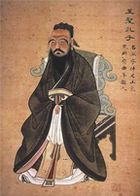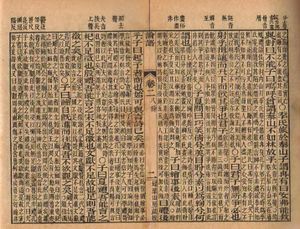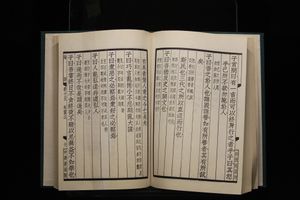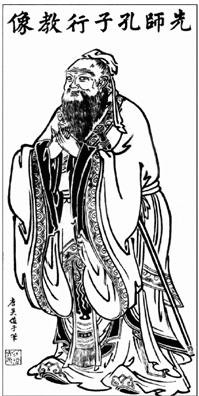تعاليم كونفوشيوس
| هذه المقالة تحتوي على نصوص بالصينية. بدون دعم الإظهار المناسب, فقد ترى علامات استفهام ومربعات أو رموز أخرى بدلاً من الحروف الصينية. |
 | |
| المؤلف | كونفوشيوس |
|---|---|
| العنوان الأصلي (إذا لم يكن بالعربية) | 論語 |
| المترجم | لون يو |
| البلد | |
| اللغة | الصينية |
| الناشر | |
| الإصدار | 475 ق.م. - 221 ق.م. |
| تعاليم كونفوشيوس | |||||||||||||||||||
|---|---|---|---|---|---|---|---|---|---|---|---|---|---|---|---|---|---|---|---|
 صفحة من تعاليم كونفوشيوس | |||||||||||||||||||
| الصينية التقليدية | 論語 | ||||||||||||||||||
| الحروف المبسطة | 论语 | ||||||||||||||||||
| |||||||||||||||||||
تعاليم كونفوشيوس أو إنجيل كونفوشيوس
| تعاليم كونفوشيوس |
|---|
هي مجموعة مسجلة من أقوال وأفعال المفكر الصيني والفيلسوف كونفوشيوس وتلامذته، بالإضافة إلى مناقشات تمت بينهم.
كتب خلال فترة الربيع والخريف من خلال فترة الدول المتحاربة (475 ق.م. - 221 ق.م.)، كان لهذه التعاليم الكونفوشيوسية تأثير كبير على الفكر والقيم في الصين ودول شرق آسيا حتى اليوم.
تاريخ
إنشاء النص

الأهمية من خلال كونفوشيوس
التفاسير

المحتويات
الفلسفة الاجتماعية
هذا الكتاب تم تجميعه من طرف تلاميذ الحكيم كونفوشيوس و يحتوي أقواله و حكمه و فلسفته في الحياة التي تقوم على الحب - حب الناس و حسن معاملتهم و الرقة في الحديث و الأدب في الخطاب . و نظافة اليد و اللسان . و أيضاً يقوم مذهبه على احترام الأكبر سناً و الأكبر مقاماً ، و على تقديس الأسرة وعلى طاعة الصغير للكبير و طاعة المرأة لزوجها .[1]
الفلسفة السياسية
كان يكره الطغيان و الإستبداد . وهو يؤمن بأن الحكومة إنما أنشئت لخدمة الشعب و ليس العكس، و أن الحاكم يجب أن يكون عتد قيم أخلاقية و مثل عليا . و من الحكم التي اتخذها كونفوشيوس قاعدة لسلوكه تلك الحكمة القديمة التي تقول : " أحب لغيرك ما تحبه لنفسك ".
ظلّت هذه الفلسفة صامدة لأكثر من 2500 سنة، و لا زال أغلبية الصينيين يتّخذونها منهجاً في الحياة رغم محاربة النظام الشيوعي لها.
التعليم
الفصول
| الكتاب | العنوان | الترجمة | ملاحظات |
|---|---|---|---|
| 1. | Xue Er 學而 | Studying | |
| 2. | Wei Zheng 為政 | The practice of government | This chapter explores the theme that political order is best gained through the non-coercive influence of moral self-cultivation than through force or excessive government regulation.[2] |
| 3. | Ba Yi 八佾 | Eight lines of eight dancers apiece | Ba Yi was a kind of ritual dance practiced in the court of the Zhou king. In Confucius' time lesser nobles also began staging these dances for themselves. The main themes of this chapter are: criticism of ritual impropriety (especially among China's political leadership); and, the need to combine learning with nature in the course moral self-cultivation.[3]
Chapters 3-9 may be the oldest in the Analects.[4] |
| 4. | Li Ren 里仁 | Living in brotherliness | This chapter explores the theme of ren, it's qualities, and the qualities of those who have it. A secondary theme is the virtue of filial piety.[5] |
| 5. | Gongye Chang 公冶長 | Gongye Chang | The main theme of this chapter is Confucius' examination of others' qualities and faults in order to illustrate the desirable course of moral self-cultivation.[6]
This chapter has traditionally been attributed to the disciples of Zigong, a student of Confucius.[7] Gongye Chang was Confucius' son-in-law.[8] |
| 6. | Yong Ye 雍也 | There is Yong | Yong is Ran Yong, also called Zhou Gong, a student of Confucius. |
| 7. | Shu Er 述而 | Transmission | Transmission, not invention [of learning]. |
| 8. | Taibo 泰伯 | Taibo | Wu Taibo was the legendary founder of the state of Wu. He was the oldest son of King Tai and the great-grandfather of King Wu of the Zhou Dynasty. |
| 9. | Zi Han 子罕 | The Master shunned | Confucius seldom spoke of advantage. |
| 10. | Xiang Dang 鄉黨 | Among the Xiang and the Dang | A "xiang" was a group of 12,500 families; a "dang" of 500 families.
This chapter is a collection of maxims related to ritual.[4] |
| 11. | Xian Jin 先進 | Those of former eras | The former generations.
This chapter has traditionally been attributed to the disciples of Min Ziqian, also known as Min Sun, a student of Confucius.[7] |
| 12. | Yan Yuan 顏淵 | Yan Yuan | Yan Hui was a common name of Zi Yuan, a favorite disciple of Confucius. |
| 13. | Zilu 子路 | Zilu | Zilu was a student of Confucius. |
| 14. | Xian Wen 憲問 | Xian asked | This chapter has traditionally been attributed to the disciples of Yuan Xian, also called both Yuan Si and Zisi; a student of Confucius.[7] |
| 15. | Wei Ling Gong 衛靈公 | Duke Ling of Wey | Duke Ling ruled from 534–493 BC in the state of Wey. |
| 16. | Ji Shi 季氏 | Chief of the Ji Clan | Ji Sun was an official from one of the most important families in Lu.
This chapter is generally believed to have been written relatively late;[4] possibly compiled from the extra chapters of the Qi version of the Analects.[7] |
| 17. | Yang Huo 陽貨 | Yang Huo | Yang was an official of the Ji clan, an important family in Lu. |
| 18. | Weizi 微子 | Weizi | Weizi was the older half-brother of Zhou, the last king of the Shang dynasty; founder of the state of Song.
The writer of this chapter was critical of Confucius.[4] |
| 19. | Zizhang 子張 | Zizhang | Zizhang was a student of Confucius.
This chapter consists entirely of sayings by Confucius' disciples.[4] |
| 20. | Yao Yue 堯曰 | Yao spoke | Yao was one of the traditional Three Sovereigns and Five Emperors of ancient China.
This chapter consists entirely of stray sentences resembling the style and content of the Shujing.[4] |
انظر أيضا
المصادر
قائمة المراجع
- المتحف البريطاني "Classical Chinese Philosophy". Retrieved June 21, 2012.
- Canetti, Elias. The Conscience of Words. Trans. Joachim Neugroschel. Publisher: Farrar Straus Giroux. 1984. ISBN 0374518815.
- Gardner, Daniel K. Zhu Xi's Reading of the Analects: Canon, Commentary, and the Classical Tradition. New York: Columbia University Press. 2003. ISBN 978-0-231-12865-0
- Els, Paul van. "Confucius' sayings entombed: On Two Han Dynasty Analects Manuscripts". Analects Studies. Leiden: Brill. 2012. Retrieved July 15, 2012.
- Lau, D.C. "Introduction". In The Analects. Trans. D.C. Lau. Hong Kong: The Chinese University Press. 2002. ISBN 962-201-980-3. Retrieved June 26, 2012.
- Legge, James. "Prolegomena". In The Confucian Analects, The Great Learning, and The Doctrine of the Mean. Trans. James Legge. New York, NY: Cosimo. 2009. ISBN 978-1-60520-644-8. Retrieved June 28, 2012.
- Riegel, Jeffrey. "Confucius", The Stanford Encyclopedia of Philosophy. Ed. Edward N. Zalta. Spring 2012. Retrieved June 28, 2012.
- Slingerland, Edward G. (Trans. & Ed.). Confucius Analects: With Selections from Traditional Commentaries. Indianapolis, IN: Hackett. 2003. ISBN 978-087220-635-9. Retrieved November 17, 2012.
- Waley, Arthur. "Terms". In The Analects of Confucius. Trans. Arthur Waley. New York: Vintage Books. 1938.
الترجمات
- الترجمة العربية لتعاليم كونفوشيوش من معهد كونفوشيوس.
- Legge, James (1861). Confucian Analects, the Great Learning, and the Doctrine of the Mean. The Chinese Classics. Vol. I. London: Trübner. Revised second edition (1893), Oxford: Clarendon Press, reprinted by Cosimo in 2006 (ISBN 978-1-60520-643-1).
- Lyall, Leonard A. (1909). The Sayings of Confucius. لندن: Longmans, Green and Co. OCLC 1435673.
- Soothill, William Edward (1910). The Analects of Confucius. Yokohama: Fukuin Printing.
- Waley, Arthur (1938). The Analects. London: George Allen and Unwin. Reprinted by Alfred A. Knopf in 2000 (ISBN 978-0-375-41204-2).
- Brooks, E. Bruce; Brooks, Taeko (2001). The Original Analects. New York: Columbia University Press.
وصلات خارجية
- The Analects Chinese-English bilingual text (Legge's translation) with links to Zhu Xi's commentary - Chinese Text Project
- Multilingual edition of the Analects in Chinese, English and French
- Legge's English translation from the University of Adelaide Library. No section numbers.
- Translations of the Analects in over 20 languages. With footnotes.
- Latin Translation (Zottoli, 1879)
- Full Text of Lunyu - English
- The Analects by Confucius written ca. 500 B.C.E.
- Audio archive in mp3 format
- The Analects of Confucius, translated by A. Charles Muller
- Analects Of Confucius online library
- http://www.confucius.org/lunyu/langa.htm


